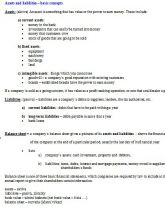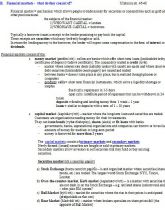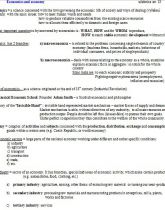Vypracované otázky: Angličtina - otázky k závěrečné zkoušce
Skrýt detaily | Oblíbený- Kvalita:82,9 %
- Typ:Vypracované otázky
- Univerzita:Vysoká škola finanční a správní
- Fakulta:Fakulta ekonomických studií
- Kategorie:Jazyky
- Podkategorie:Angličtina
- Předmět:Angličtina
- Autor:kralova.lucie
- Rozsah A4:51 strán
- Zobrazeno:1 971 x
- Stažené:0 x
- Velikost:0,4 MB
- Formát a přípona:MS Office Word (.doc)
- Jazyk:český
- ID projektu:4361
- Poslední úprava:20.10.2014
1.A. Economics and economy
Economics = a science concerned with the laws governing the economic life of society and ways of dealing (vyřešení problémů) with the main issues: how to meet human wants and needs
how to produce valuable commodities from the existing scarce resources
how to allocate them efficiently to domestic and foreign users
the most important question to by answered by economists is : WHAT, HOW and for WHOM to produce,
HOW to reach stable economic development without crises
economics has 2 branches: a) microeconomics - is related to the problems concerning single elements of country´s
economy (business firms, households, markets, behaviour of
individual consumers, and prices of single products)
b) macroeconomics - deals with issues relating to the economy as a whole, examines and
explains economic facts in aggregate / in totals for the whole
country
Main tasks are: to reach economic stability and prosperity
Fighting negative phenomena (unemployment,
inflation and recession)
Origin of economics - as a science originated at the end of 18th century (Industrial Revolution)
Classical Economic School: Founder: Adam Smith - a Scottish economics and philosopher
Teory of the “Invisible Hand” : invisible hand represented market mechanism - market forces of supply and demand
Market mechanism is able, without directives of any authority, to allocate resources and
production output. People should be left free (laissez-faire) to pursue their own goals.
Under perfect competition they thus contribute to the welfare of the whole community.
Economy = complex of activities and subjects concerned with the production, distribution, exchange and consumption of
goods within a certain area (e.g. Czech Republic, or world economy)
Economic sectors = large parts of the national economy working under different and rather specific conditions:
a) industry
b) agriculture
c) transport
d) construction
e) trade,
f) etc.
Economics = a science concerned with the laws governing the economic life of society and ways of dealing (vyřešení problémů) with the main issues: how to meet human wants and needs
how to produce valuable commodities from the existing scarce resources
how to allocate them efficiently to domestic and foreign users
the most important question to by answered by economists is : WHAT, HOW and for WHOM to produce,
HOW to reach stable economic development without crises
economics has 2 branches: a) microeconomics - is related to the problems concerning single elements of country´s
economy (business firms, households, markets, behaviour of
individual consumers, and prices of single products)
b) macroeconomics - deals with issues relating to the economy as a whole, examines and
explains economic facts in aggregate / in totals for the whole
country
Main tasks are: to reach economic stability and prosperity
Fighting negative phenomena (unemployment,
inflation and recession)
Origin of economics - as a science originated at the end of 18th century (Industrial Revolution)
Classical Economic School: Founder: Adam Smith - a Scottish economics and philosopher
Teory of the “Invisible Hand” : invisible hand represented market mechanism - market forces of supply and demand
Market mechanism is able, without directives of any authority, to allocate resources and
production output. People should be left free (laissez-faire) to pursue their own goals.
Under perfect competition they thus contribute to the welfare of the whole community.
Economy = complex of activities and subjects concerned with the production, distribution, exchange and consumption of
goods within a certain area (e.g. Czech Republic, or world economy)
Economic sectors = large parts of the national economy working under different and rather specific conditions:
a) industry
b) agriculture
c) transport
d) construction
e) trade,
f) etc.



